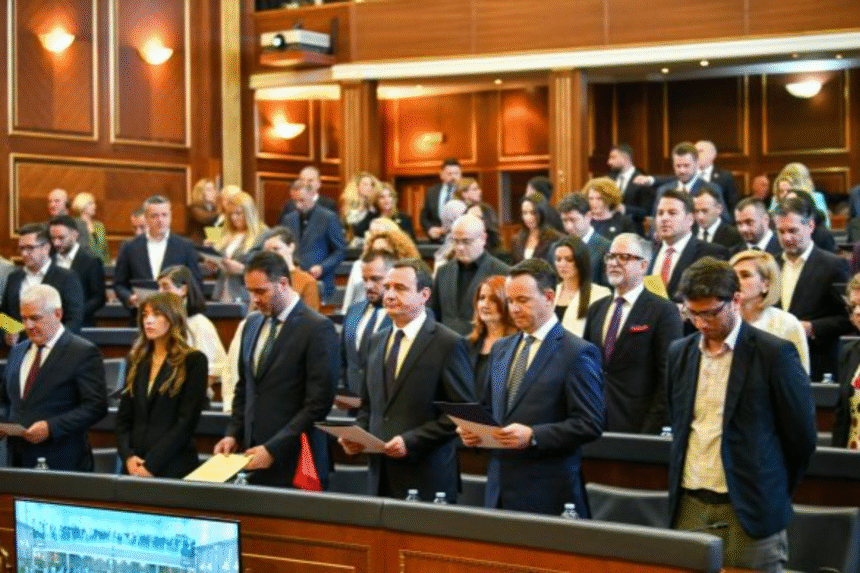The Constitutional Court has once again ordered the deputies of the Kosovo Assembly to constitute the new parliamentary composition resulting from the February 9 elections, this time with clearer instructions.
They are instructed to constitute the Assembly within a 30-day deadline and to elect the Speaker through an open vote, with the same candidate being put to a vote no more than three times.
But when can the constitutive session be called?
The exact timing is unknown. It could take place this week or, at the latest, next week, depending on when the full verdict from the Constitutional Court is published.
The constitutive session cannot be held until the Constitutional Court publishes the full verdict.
According to Eugen Cakolli from the Kosovo Democratic Institute, based on previous practices, the Constitutional Court usually takes one to two weeks at most to publish the full verdict.
The Assembly’s constitutive session was first convened on April 15 by the President of Kosovo, Vjosa Osmani. Since then, deputies have held 54 continuations of this session, led by the oldest member of the new legislature, Avni Dehari, who served as the presiding officer.
The Constitutional Court stated that presiding officer Dehari did not act based on the previous ruling of the Court dated June 26, adding that all sessions held between June 27 and July 26 are to be declared invalid.
According to the Assembly’s Rules of Procedure, the presiding officer is responsible for the orderly conduct of the session, and Dehari is expected to call the session as soon as the Court publishes the full verdict in the Official Gazette.
How has the decision been received?
The decision has been welcomed by the parties that were in opposition during the previous mandate, but criticized by the election-winning party, the Vetëvendosje Movement (LVV).
LVV called the decision arbitrary, while the Democratic Party of Kosovo (PDK) and the Democratic League of Kosovo (LDK) described it as a constitutional and democratic victory. The Alliance for the Future of Kosovo (AAK) spoke of the overthrow of a dictatorship.
According to LVV, the Constitutional Court’s notice “constitutes a dangerous deviation from its constitutional role” and is “in conflict with the fundamental principles of the rule of law and separation of powers.”
LVV deputy and acting Minister of Justice Albulena Haxhiu said at a press conference on August 10 that “the Constitutional Court’s notice is a serious concern because it is a blatant overreach of the powers the Court has.”
Asked whether her party would respect the decision, Haxhiu said: “You will understand what our next steps will be after this notice and ruling.”
PDK leader Memli Krasniqi said that with this decision, his party’s position was confirmed that LVV “has held the Kosovo Assembly hostage, deliberately and systematically blocking its functionalization for narrow power interests, acting completely outside the Constitution.”
LDK Chairman Lumir Abdixhiku welcomed the Court’s decision, calling it “a great victory for democracy.”
Ardian Gjini from AAK stated that “democracy has won, dictatorship has fallen” with the Constitutional Court’s decision.
What is expected from the full verdict?
Besides paving the way for holding the constitutive session the next day, the full verdict is expected to clarify more issues.
It may also respond to a now withdrawn request by President Vjosa Osmani regarding what would happen if the Assembly was not constituted by July 26 – the previously set deadline by the Court.
In its earlier ruling, which deputies ignored, the Constitutional Court did not specify the legal consequences of such disregard.
Now, the Court may clarify what the consequences would be if deputies again ignore the 30-day order to form the new Assembly.
“Even though the President withdrew her request, the Constitutional Court has the legal right to review it, because this is clearly a matter of public and constitutional interest,” said Cakolli.
He added that such deadlines tend to be disregarded by political actors who “lack the political will to find solutions, not because they do not know the procedures.”
“Parties will continue to violate deadlines as long as the Court does not clearly write what consequences deputies and the Assembly will face in case of further failures,” he said.
How many seats does each party have?
This months-long crisis stems from the lack of a political agreement among parliamentary parties, as no party won a majority to govern alone.
Prime Minister in office Albin Kurti’s Vetëvendosje won 48 seats, but other parliamentary parties have refused to vote for its candidate for Assembly Speaker, for whom at least 61 votes are needed.
While Vetëvendosje insists that Albulena Haxhiu is the rightful candidate, several major parliamentary parties, including PDK, LDK, and AAK, exclude her as “divisive.”
PDK came second with 24 seats, LDK third with 20, followed by the Serb List – the largest Serb party in Kosovo – with 9, and the coalition of AAK and the Social Democratic Initiative with 8 seats.
An additional 11 seats belong to minority communities.







